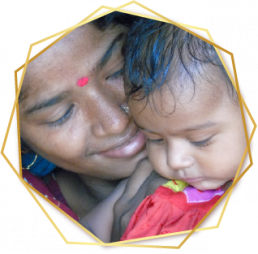Nurturing Hope Through Proactive Maternal and Child Health Initiatives
Anita Devi’s journey exemplifies the transformative impact of proactive maternal and child health interventions. Facing challenges in providing adequate nutrition for her four children due to limited financial resources, Anita’s plight caught the attention of the CRY America project team.
With the family’s primary income stemming from her husband’s labor in the fields, financial constraints loomed large. When growth monitoring conducted by the project team revealed that three of Anita’s children were severely underweight, it underscored the urgent need for intervention.
It was found that inadequate breastfeeding, lasting only a few months, had contributed significantly to the children’s malnourishment. Recognizing the necessity for comprehensive support, the project team adopted a holistic approach when Anita was expecting her fourth child.

The project team facilitated her enrollment in Anganwadi and ANM records, ensuring she received necessary vaccinations. Throughout Anita’s pregnancy, the project team guided her through her antenatal tests, stressed the benefits of institutional delivery, and emphasized the importance of colostrum feeding for the child’s health.
As a result of these interventions, Anita’s fourth child thrived, highlighting the significant positive impact of targeted health initiatives in resource-constrained environments. Anita Devi’s story underscores the vital role of informed maternal care practices in fostering the well-being of children.
Project DVEUS is working in 60 villages of Kaushambi district. The organization is working with 11,702 households with majority reference communities from Dalit and minorities groups. The status of antenatal care and postnatal care remains very poor in the community. Lack of awareness in the community results in home deliveries, lack of immunization of pregnant women and infants as well as rising number of malnourished children in the community.
CRY America Project DVEUS ensures that the community and the household are aware of appropriate child rearing practices. The project works towards reduction in infant deaths including neonatal deaths through strengthening home based newborn care as well as improving facility based care and treatment in government institutions. Another major focus is on combating malnutrition through strengthening responsive strategy at community level.
The key activities under the project are engaging with adolescent girls and children groups on nutrition, menstrual hygiene and immunization, tracking of low birth weight babies as well as support of take home ration to the pregnant and lactating mothers and children of age 7 months to 6 years from Anganwadi.

1300
families have developed kitchen gardens in their homes
138
children moved from the severely underweight (SUW) category to the moderately under (MUW) category & (remove this last &)
90
children improved from being moderately underweight to attaining a normal weight.
699
Village Health and Nutrition Day (VHND) conducted
1122
children were given complete immunization during VHNDs
1196
pregnant women were immunized as per schedule

1003
pregnant women had institutional deliveries

● Follow up with 1446 pregnant women and 1264 lactating mothers to ensure timely immunization, health check-up and referral services
● Growth monitoring of 6712 children in the age group of 6-36 months
● Complete Immunization of 1294 children under 0-1 year
● System strengthening of 4 Public Health Centerss, 2Community Health Centers and 5 Sub Health Centers
● Sessions on early marriage, early pregnancy nutrition, iron tablets and Life skills session will be conducted for all 27 adolescent groups.
● Free seeds will be distributed to 1500 households with malnourished children maintaining kitchen gardens.
2023 Grant Disbursed $57,020

























